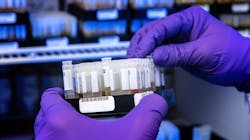The Department of Health and Human Services (HHS) withdrew a policy that directed the U.S. Food and Drug Administration (FDA) not to enforce premarket review requirements for laboratory developed tests (LDTs).
The FDA said the action “will help ensure that COVID-19 tests are accurate and reliable.”
In conjunction with the policy change from HHS, the FDA said it updated its rules regarding tests, including LDTs, that developers are currently selling prior to or without authorization.
To ensure ample availability of rapid and high-volume testing options, the FDA said it will focus its review of requests for emergency use authorization (EUA) on the following types of tests:
- At-home and point-of-care (POC) diagnostic tests for use with or without a prescription and that can be manufactured in high volumes
- High-volume, lab-based molecular diagnostic tests (and home collection kits for use with such tests) that expand testing capacity or accessibility, such as through pooling of specimens to increase throughput, testing of specimens collected at home and shipped to the lab, screening of asymptomatic people or detecting multiple different respiratory viruses at once
- Lab-based and POC high volume antibody tests that can measure the amount of antibodies (fully quantitative antibody tests) or the amount of neutralizing antibodies
- Tests for which the request is from, or supported by, a U.S. government stakeholder, such as the Biomedical Advanced Research and Development Authority or the National Institutes of Health’s Rapid Acceleration of Diagnostics.
“The FDA remains committed to helping to increase the availability of tests that will have the biggest impact on the nation’s ongoing COVID-19 testing needs, such as at-home and point-of-care diagnostic tests that can be produced in high volumes,” said Jeff Shuren, MD, JD, Director of the FDA’s Center for Devices and Radiological Health. “By focusing our review on these types of tests and helping to ensure that available tests have appropriate oversight, we can better respond to the pandemic as the nation’s testing needs continue to evolve.”
The FDA said developers of other types of tests may consider pursuing marketing authorization through traditional device review pathways such as 510(k) notification or De Novo classification.
“As discussed in the guidance being reissued today, ‘Policy for Coronavirus Disease-2019 Tests During the Public Health Emergency (Revised),’ the FDA now generally expects newly offered COVID-19 tests, including LDTs, to have an EUA, or traditional marketing authorization such as a granted De Novo or cleared 510(k), prior to clinical use,” the agency said.
The FDA said it also is ending emergency policies that allowed developers to market tests prior to or without an EUA after the test was validated and a notification was provided to the FDA. That means for tests currently being offered without the submission of an EUA request, the FDA said it expects the submission of an EUA request. For those tests and notified tests with pending EUA requests, the FDA said it intends to review the EUA requests and, if the test is not subsequently authorized, expects developers to cease marketing the test within 15 calendar days of being notified.
The agency also said it issued an umbrella EUA for serial testing with certain molecular LDTs.
“These tests will be able to be used for testing at regular intervals as part of serial testing programs, such as those established at places like schools, workplaces or community groups. The umbrella EUA efficiently authorizes certain tests to help increase access to accurate and reliable molecular diagnostic tests,” the FDA said.

